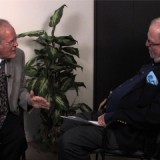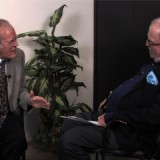John Cummins. MP, Delta-Richmond East (Conservative), a former commercial fisherman, has called into question the appointment of four men to the Cohen Inquiry into the collapse of the Fraser River sockeye with the mandate to inquire into, amongst other things, the actions or non-actions of the Department of Fisheries and Oceans.
These men are Carl Walters, a fisheries professor at UBC, Brian Riddell, a former long-time DFO senior manager, Thomas Quinn, a fisheries advisor to DFO over the years, and Paul LeBlond, a long-time advisor to the federal fisheries minister of the day. All men are acknowledged as experts in the field and it is this which I will show, as Cummins has shown, that is the root of the problem.
There are two things to bear in mind here – first, Cummins is not calling the credentials of any of these men into question, and nor do I; second, the Commission directs Justice Cohen to develop recommendations “for any changes to policies, practices and procedures of the Department [DFO] in relation to the management of the Fraser River sockeye salmon fishery and included in this mandate is a complete review of aquaculture and its impact on pacific salmon. The review is to include government involvement.”
I am shocked into disbelief that Cohen would appoint these men as advisors because they are in fact witnesses, and important ones. Here’s what Cummins has to say:
Cohen ought instinctively to know that a full-fledged judicial inquiry into the department’s management of the salmon fishery should not, indeed must not employ people who had in any way advised the Department or those who had relied on departmental funding for their work. This is akin to asking them to investigate themselves and rule as to whether their advice was appropriate and whether it was properly implemented or disregarded by the Department.
The notion of a conflict of interest always seems to confound most those who ought best be able to spot one. One cannot begin to look at any aspect of the Pacific Coast Salmon fishery without immediately looking at the DFO over the years. This requires the closest look not only at the decisions they made but the advice they had, and from whom, when making them.
It is no more complicated than this: an investigation of DFO and its decisions requires that the actions of all who participated in the decision making process be carefully investigated. To have those who participated be advisors not witnesses is intolerable and I’m surprised these men haven’t declined on that account for one cannot be an advisor if one is a witness and each of these men are prime witnesses.
Is it fair to conclude that these advisors are being paid a healthy per diem which they wouldn’t get if they were advisors? I’m not suggesting that these fine scientists would put personal welfare ahead of duty but it doesn’t matter what I think. What matters is what would ordinary people think because as I will demonstrate in a moment, it’s appearances that matter so much in proceedings like these.
There is absolutely no way this can be avoided being said: Mr. Justice Cohen has, from the outset, disqualified his commission’s ability to carry out its mandate and must resign or re-constitute his advisors.
Many British Columbians were delighted to learn of this commission. Now, we were told, we would get out all of the evidence. We assumed that this was a “non political” exercise and dedicated to getting to the bottom of decisions made by DFO over the years.
Now, what do they find?
That the very witnesses who should be examined and cross examined Judge Cohen has sheltered from this by being made advisors!
It’s a matter of the commission seeming to be fair. The underlying principle by which our courts or tribunals operate can be stated, as it was long ago, thusly “Justice must not only be done, but should manifestly and undoubtedly be seen to be done”. Be seen to be done…It must not only be fair it must be seen as fair. These advisors are precisely the people I would want to see examined and cross-examined were I the commissioner. What’s happened to Mr. Justice Cohen’s sense of fair play puzzles me greatly as it must all interested British Columbians.
I do not say that “the fix” is in, but given the way the commissioner has arranged to have witnesses made into advisors one might be tempted to ponder that notion.
For while the Commissioner, Bruce Cohen, may not be political, his boss, Stephen Harper – a man whose only demonstrated interest in the environment has been to let corporate friends destroy it – sure as hell is.
Commissioner Cohen must terminate these advisors and hand them subpoenas or forfeit his and the commission’s right to have the confidence of the public.
Read Conservative MP John Cummins’ press releases on the subject at www.johncummins.ca







